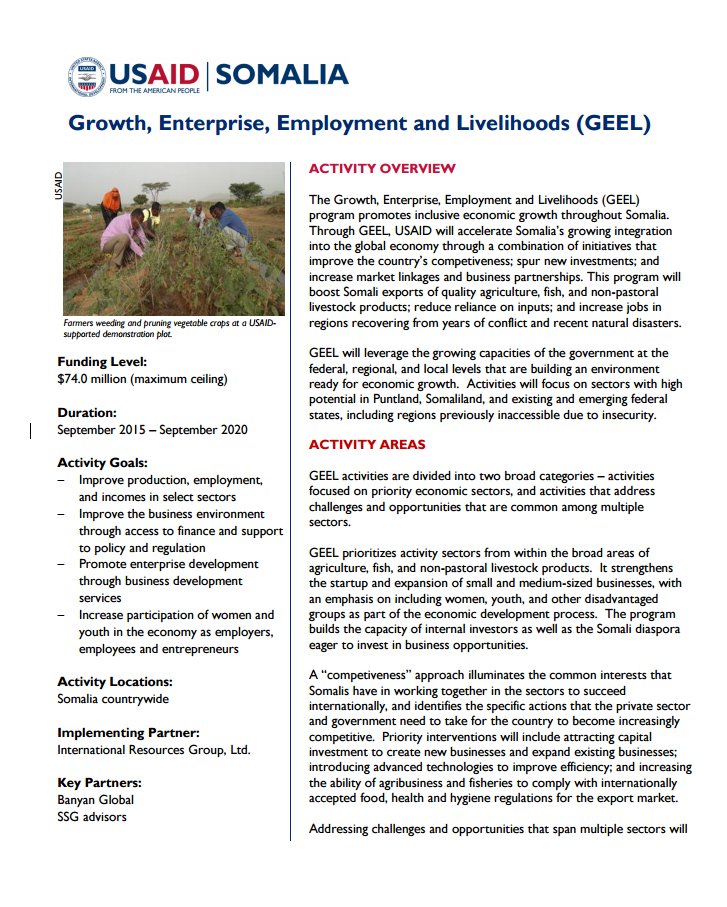Speeches Shim
![]() (442k) Fact Sheet Somalia
(442k) Fact Sheet Somalia
ACTIVITY OVERVIEW
The Growth, Enterprise, Employment & Livelihoods (GEEL) program promotes inclusive economic growth in Somalia. Through GEEL, USAID accelerates Somalia’s integration into the global economy by improving the country’s competitiveness in export markets, reducing reliance on imports, increasing market linkages and business partnerships, spurring new investments to create jobs, and engaging the private sector to support resilience of vulnerable populations. In regions recovering from years of conflict and natural disasters, USAID aims to boost production of high-quality fish, agriculture, and dairy products for domestic and international consumers.
GEEL is leveraging the growing capacities of the government at the federal, regional, and local levels to build foundations for sustainable economic growth. Activities are focused on value chains with high potential across all regions of Somalia, and include the integration of renewable energy solutions across sectors for private sector growth.
ACTIVITY AREAS
GEEL activities are divided into two categories: (1) technical assistance and investment facilitation for priority economic sectors; and (2) policy and regulatory reforms to address challenges and opportunities that are common among multiple sectors.
To support the competitiveness of Somali entrepreneurs in the global market, GEEL brings together private sector actors and government institutions to attract capital investment for businesses creation and expansion. The project builds the capacity of internal and Somali diaspora investors to contribute to economic growth through investment facilitation events and micro-finance linkages. GEEL strengthens the start-up and expansion of small and medium-sized enterprises, and creates and expands opportunities for women, youth, and other vulnerable groups.
Through technical assistance, GEEL is working with new and established Somali businesses to increase production capacity and improve quality in target value chains like bananas, sesame, and dairy, and is introducing advanced technologies to increase efficiency and reduce costs. The project facilitates access to financial and material inputs, facilitates export logistics, and constructs small-scale infrastructure projects like irrigation canals, access roads, and silage stores to boost the capacities of high-potential businesses. GEEL also facilitates compliance with international food, health, and hygiene standards among agribusinesses and fisheries enterprises through trainings and linkages to international buyers. Through USAID’s Center for Resilience, GEEL is also developing new private sector-driven strategies to build the resilience of smallholder farmers and their communities in some of Somalia’s most crisis-prone areas.
ACTIVITY IMPACT
Despite two decades of conflict, Somalia’s agriculture, fisheries, and dairy sectors have remained resilient and production is growing to meet rising regional and international demand for high-quality commodities. Through a unique and progressive transformation, Somalia’s engagement with international markets is steadily increasing. GEEL continues to support the burgeoning private sector, leveraging Somalia’s resources and assets for inclusive and sustainable growth.
Somalia’s agriculture value chains are reaching international markets. GEEL has trained more than 8,000 farmers on efficient production practices, improved irrigation technologies, and created market linkages. An on-farm training approach using demonstration plots decreases risk for farmers and ensures the practical application of new knowledge. Vegetable producers have reported harvest yield increases of up to 200 percent following technical assistance, and GEEL’s facilitation of market linkages at international agriculture trade shows in Dubai and Istanbul have increased exports and contributed to the re-emergence of Somalia as a player on the global market.
Somali waters host some of the richest fishing grounds in Africa, and GEEL is promoting sustainable growth in the sector by increasing cold chain facilities, improving fish processing techniques, reducing production costs, and working with fisherfolk and fish businesses to capture data for analysis and long-term fisheries management. The project’s sector activities include rehabilitation of cold storage facilities, trainings on international food handling and safety standards, the introduction of solar and other renewable technologies, and relationship-building with exporters and buyers.
Somali youth are employed to better respond to market needs. When the COVID-19 crisis started, GEEL pivoted to help businesses protect jobs and support youth at-risk of losing income. With GEEL support, six local small and medium enterprises employed more than 300 Somali youth to produce 500,000 Centers for Disease Control (CDC)-compliant face coverings for their local communities in and around Mogadishu. In collaboration with the U.S. Ambassador to Somalia and the Federal Government of Somalia, GEEL helped youth obtain training to take advantage of employment opportunities that respond to new demands for face coverings and other critical supplies, such as hand sanitizer and disinfectant.


Comment
Make a general inquiry or suggest an improvement.